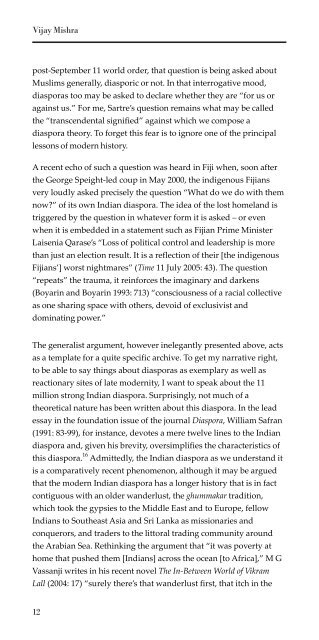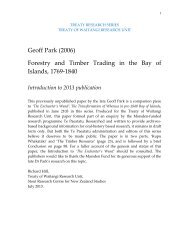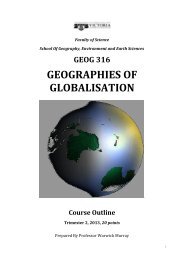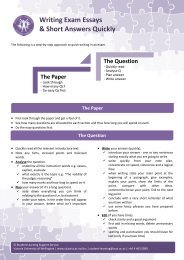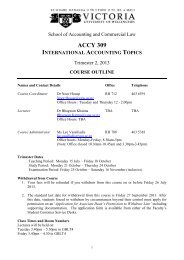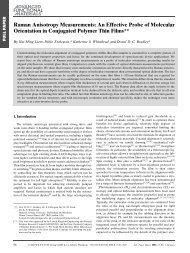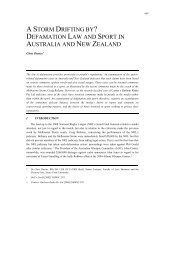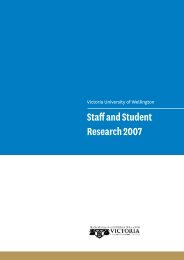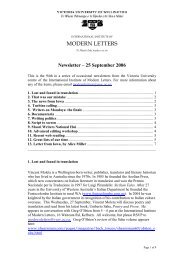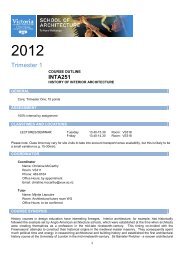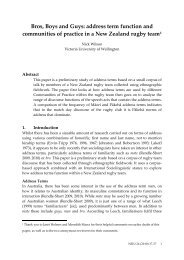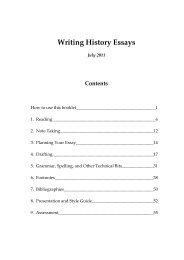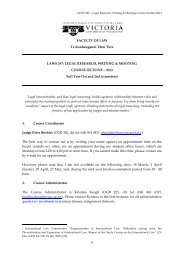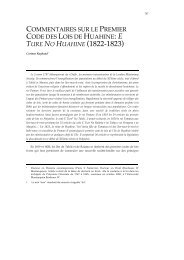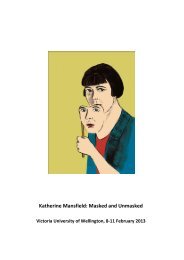The Diasporic Imaginary and the Indian Diaspora - Victoria ...
The Diasporic Imaginary and the Indian Diaspora - Victoria ...
The Diasporic Imaginary and the Indian Diaspora - Victoria ...
You also want an ePaper? Increase the reach of your titles
YUMPU automatically turns print PDFs into web optimized ePapers that Google loves.
Vijay Mishra<br />
post-September 11 world order, that question is being asked about<br />
Muslims generally, diasporic or not. In that interrogative mood,<br />
diasporas too may be asked to declare whe<strong>the</strong>r <strong>the</strong>y are “for us or<br />
against us.” For me, Sartre’s question remains what may be called<br />
<strong>the</strong> “transcendental signified” against which we compose a<br />
diaspora <strong>the</strong>ory. To forget this fear is to ignore one of <strong>the</strong> principal<br />
lessons of modern history.<br />
A recent echo of such a question was heard in Fiji when, soon after<br />
<strong>the</strong> George Speight-led coup in May 2000, <strong>the</strong> indigenous Fijians<br />
very loudly asked precisely <strong>the</strong> question “What do we do with <strong>the</strong>m<br />
now?” of its own <strong>Indian</strong> diaspora. <strong>The</strong> idea of <strong>the</strong> lost homel<strong>and</strong> is<br />
triggered by <strong>the</strong> question in whatever form it is asked – or even<br />
when it is embedded in a statement such as Fijian Prime Minister<br />
Laisenia Qarase’s “Loss of political control <strong>and</strong> leadership is more<br />
than just an election result. It is a reflection of <strong>the</strong>ir [<strong>the</strong> indigenous<br />
Fijians’] worst nightmares” (Time 11 July 2005: 43). <strong>The</strong> question<br />
“repeats” <strong>the</strong> trauma, it reinforces <strong>the</strong> imaginary <strong>and</strong> darkens<br />
(Boyarin <strong>and</strong> Boyarin 1993: 713) “consciousness of a racial collective<br />
as one sharing space with o<strong>the</strong>rs, devoid of exclusivist <strong>and</strong><br />
dominating power.”<br />
<strong>The</strong> generalist argument, however inelegantly presented above, acts<br />
as a template for a quite specific archive. To get my narrative right,<br />
to be able to say things about diasporas as exemplary as well as<br />
reactionary sites of late modernity, I want to speak about <strong>the</strong> 11<br />
million strong <strong>Indian</strong> diaspora. Surprisingly, not much of a<br />
<strong>the</strong>oretical nature has been written about this diaspora. In <strong>the</strong> lead<br />
essay in <strong>the</strong> foundation issue of <strong>the</strong> journal <strong>Diaspora</strong>, William Safran<br />
(1991: 83-99), for instance, devotes a mere twelve lines to <strong>the</strong> <strong>Indian</strong><br />
diaspora <strong>and</strong>, given his brevity, oversimplifies <strong>the</strong> characteristics of<br />
this diaspora. 16 Admittedly, <strong>the</strong> <strong>Indian</strong> diaspora as we underst<strong>and</strong> it<br />
is a comparatively recent phenomenon, although it may be argued<br />
that <strong>the</strong> modern <strong>Indian</strong> diaspora has a longer history that is in fact<br />
contiguous with an older w<strong>and</strong>erlust, <strong>the</strong> ghummakar tradition,<br />
which took <strong>the</strong> gypsies to <strong>the</strong> Middle East <strong>and</strong> to Europe, fellow<br />
<strong>Indian</strong>s to Sou<strong>the</strong>ast Asia <strong>and</strong> Sri Lanka as missionaries <strong>and</strong><br />
conquerors, <strong>and</strong> traders to <strong>the</strong> littoral trading community around<br />
<strong>the</strong> Arabian Sea. Rethinking <strong>the</strong> argument that “it was poverty at<br />
home that pushed <strong>the</strong>m [<strong>Indian</strong>s] across <strong>the</strong> ocean [to Africa],” M G<br />
Vassanji writes in his recent novel <strong>The</strong> In-Between World of Vikram<br />
Lall (2004: 17) “surely <strong>the</strong>re’s that w<strong>and</strong>erlust first, that itch in <strong>the</strong><br />
12


